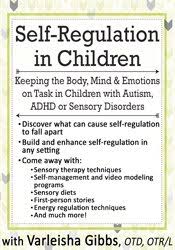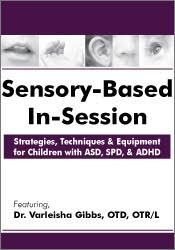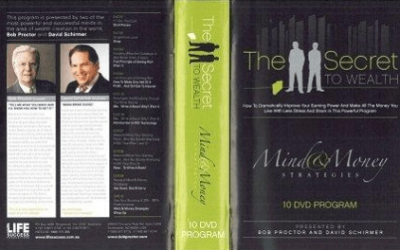🌟 New Year Offer 🌟
Celebrate 2026 with 30% OFF on all products! Use code: NEWYEAR2026. Hurry, offer ends soon!
Available for Pre-Order. This product will be available within a few days.
Varleisha Gibbs – Self-Regulation in Children Keeping the Body, Mind & Emotions

- Discover what can cause self-regulation to fall apart
- Build and enhance self-regulation in any setting
- Come away with:
- sensory therapy techniques
- self-management and video modeling programs
- sensory diets
- first-person stories
- energy regulation techniques
- and much more!
Children with Sensory Processing Disorders, ADHD or autism have much in common. They are challenged with physical problems that affect their ability to focus and can also cause them to be emotionally reactive. Children who have trouble self-regulating throughout the day are missing out on typical childhood experiences in school, on the playground and with their families. They have difficulties in making and keeping friends. This recording looks at the underlying factors of poor self-regulation and how they affect the child. The course emphasizes practical interventions! You will walk away with details on how to create simple but effective programs in clinical, school and home settings:
- Sensory therapy techniques
- Simple self-management and video modeling programs
- Sensory diets
- First-person stories
- Energy regulation techniques
- Communication methods
- Transition strategies
- Behavioral Strategies
Clinical programs such as Interactive Metronome®, Sound Therapy, and Emotional Freedom Technique (EFT™) will be discussed, as will timely topics such as medication vs. non-medication for ADHD and new insights from research into biomedical aspects of autism.
- Summarize characteristics of sensory modulation disorder, ADHD and autism in relation to assessment and treatment planning.
- Utilize clinical strategies for SPD to improve client engagement at home and school.
- Communicate cognitive and attention strategies to improve an ADHD client level of functioning.
- Analyze the efficacy of non-medication ADHD interventions in a clinical setting.
- Utilize communication strategies that provide control in clients with autism.
- Utilize clinical strategies and identify how they can alleviate symptoms of SPD and ADHD.
Would you like to receive Varleisha Gibbs – Self-Regulation in Children Keeping the Body, Mind & Emotions ?
How Self Regulation Affects a Child’s Physical, Mental and Emotional Wellbeing
- Overlay of systems
- Overlap with sensory processing disorder,
- ADHD, autism, giftedness, anxiety and related conditions
Sensory Processing Disorder (SPD)
- Vestibular, proprioceptive, and sensory modulation characteristics
- What can go wrong
- Making it right: case studies and videos
- Therapeutic Strategies: Interactive Metronome® (IM), Sound Therapy, brushing, sensory diets, and MeMoves™
Creating a Sensory Diet
- Designing and implementing sensory diets
ADHD
- Parker’s guidelines for giving meds
- Greenspan’s strategies for avoiding meds
- Cognitive strategies, attention strategies and mindfulness meditation
Self-Management
- As a powerful behavior program for ADHD
- Case study on breaking “stimming” habits
Utilizing Video
- Role play & video modeling
- Teaching functional skills
- Catching child “being good”
Autism
- Layers of autism
- Working with emotions
- Communication strategies that provide control
- Match-and-repeat technique for social engagement
- Dealing with picky eating and poor sleep habits
- Behavioral strategies for eliminating difficult behavior
First-Person Stories
- What, why and how
Making Transitions Uneventful
- Strategies for smooth transitions
Other Approaches
- Music therapy
- Alternative therapy
Calming Strategies
- Music, Me-Moves™
- Deep pressure
- Ease™
Course Features
- Lecture 0
- Quiz 0
- Duration Lifetime access
- Skill level All levels
- Students 0
- Assessments Yes





